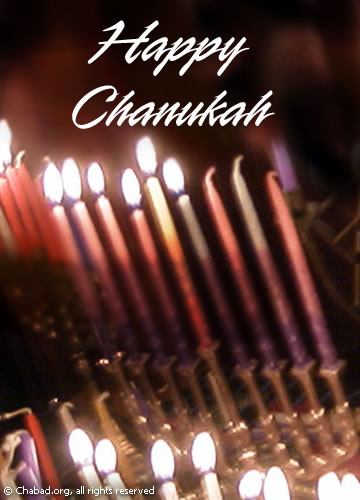Tragic-Punishment, Wondrous-Salvation
Have you seen the Hayom Yom calendar for this date? It’s fascinating!
The tragic-punishment of the sins committed by the Jews in the times of Chanukah was the
a) Destruction of the Temple (in spirit)
b) Death
c) Subjugation in exile.
The Rebbe says “tragic-punishment”. What is the difference between tragedy and punishment?
When a person sins and suffers, that suffering may be punishment or it may be the consequence of the act. Put your finger in the fire and it will hurt. Punishment or consequence?
Often the punishment is joined to the consequence and they occur simultaneously. But they are different.
The laws of Torah are also the laws of creation. Mess up Torah and you’re messing up creation. Natural consequence. Fix what is wrong in observing Torah and the consequences disappear. Naturally. Punishment is the process by which the damage caused by sin is repaired.
The incomparable Reb Yoel Kahn taught us: A boy was running around barefoot and when told he might hurt himself. His response was, “I’m not afraid”.
You’ll get a splinter. “I’m not afraid.”
It will get infected. “I’m not afraid.”
So he gets a splinter, it gets infected, gangrene, is rushed to the hospital and after being treated with painful surgery and stitches, he is released and is again running about barefoot.
He is told he’ll get a splinter. His reply is the same “I’m not afraid”
It will get infected. “I’m not afraid.”
We will have to take you tot the hospital. “Oh! I’m scared!”
When Torah tells us not to eat a cockamamie food, that’s like saying don’t run barefoot or don’t cause damage. But when Torah says that if you do you will get 39 lashes, that’s like saying you’ll have to go to the hospital! So which statement should frighten you, the damage or the cure?
Punishment in Torah is the cure that heals the wound and makes it go away. When we see the suffering that follows after sin (like exile) it is partly punishment and partly consequence.
And now we know why the Rebbe hyphenated the two words, “Punishment-tragedy.”
Then, when the Jews did Teshuvah and great sacrifice, it brought the ‘wonder-salvation’ that was the miracle of Chanukah.
Wonder means miraculous – Peleh in Hebrew. Salvation means antidote; the solution to a threatening predicament.
So when Galut – exile – ends, is it a miracle or nature restored?
Was the collapse of Soviet communism a miracle or the inevitable fate of an evil, deceitful empire? Perhaps the miracle was that it could last as long as it did and its collapse was nature finding balance, correcting itself.
In the Chanukah story, when the Jews did Teshuvah it brought a ‘miraculous-antidote’, a combination of natural and super-natural results. Natural because evil must fail and light will dispel darkness naturally. And miraculous because it caught people’s attention and shook up their beliefs. It brought a new awareness. Natural occurrence doesn’t have that effect.
Now we know why the Rebbe hyphenated the words “wonder-salvation”.
Now here’s one for you:
Riddle: Why should the words “Evil-deceitful” be hyphenated?














